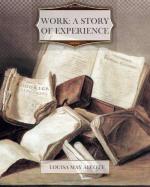She knocked at several other doors, to receive the same reply. She even tried a slop-shop, but it was full, and her pale face was against her. Her long illness had lost her many patrons, and if one steps out from the ranks of needle-women, it is very hard to press in again, so crowded are they, and so desperate the need of money.
One hope remained, and, though the way was long, and a foggy drizzle had set in, she minded neither distance nor the chilly rain, but hurried away with anxious thoughts still dogging her steps. Across a long bridge, through muddy roads and up a stately avenue she went, pausing, at last, spent and breathless at another door.
A servant with a wedding-favor in his button-hole opened to her, and, while he went to deliver her urgent message, she peered in wistfully from the dreary world without, catching glimpses of home-love and happiness that made her heart ache for very pity of its own loneliness. A wedding was evidently afoot, for hall and staircase blazed with light and bloomed with flowers. Smiling men and maids ran to and fro; opening doors showed tables beautiful with bridal white and silver; savory odors filled the air; gay voices echoed above and below; and once she caught a brief glance at the bonny bride, standing with her father’s arm about her, while her mother gave some last, loving touch to her array; and a group of young sisters with April faces clustered round her.
The pretty picture vanished all too soon; the man returned with a hurried “No” for answer, and Christie went out into the deepening twilight with a strange sense of desperation at her heart. It was not the refusal, not the fear of want, nor the reaction of overtaxed nerves alone; it was the sharpness of the contrast between that other woman’s fate and her own that made her wring her hands together, and cry out, bitterly:
“Oh, it isn’t fair, it isn’t right, that she should have so much and I so little! What have I ever done to be so desolate and miserable, and never to find any happiness, however hard I try to do what seems my duty?”
There was no answer, and she went slowly down the long avenue, feeling that there was no cause for hurry now, and even night and rain and wind were better than her lonely room or Mrs. Flint’s complaints. Afar off the city lights shone faintly through the fog, like pale lamps seen in dreams; the damp air cooled her feverish cheeks; the road was dark and still, and she longed to lie down and rest among the sodden leaves.
When she reached the bridge she saw the draw was up, and a spectral ship was slowly passing through. With no desire to mingle in the crowd that waited on either side, she paused, and, leaning on the railing, let her thoughts wander where they would. As she stood there the heavy air seemed to clog her breath and wrap her in its chilly arms. She felt as if the springs of life were running down, and presently would stop; for, even when the old question, “What shall I do?” came haunting her, she no longer cared even to try to answer it, and had no feeling but one of utter weariness. She tried to shake off the strange mood that was stealing over her, but spent body and spent brain were not strong enough to obey her will, and, in spite of her efforts to control it, the impulse that had seized her grew more intense each moment.




